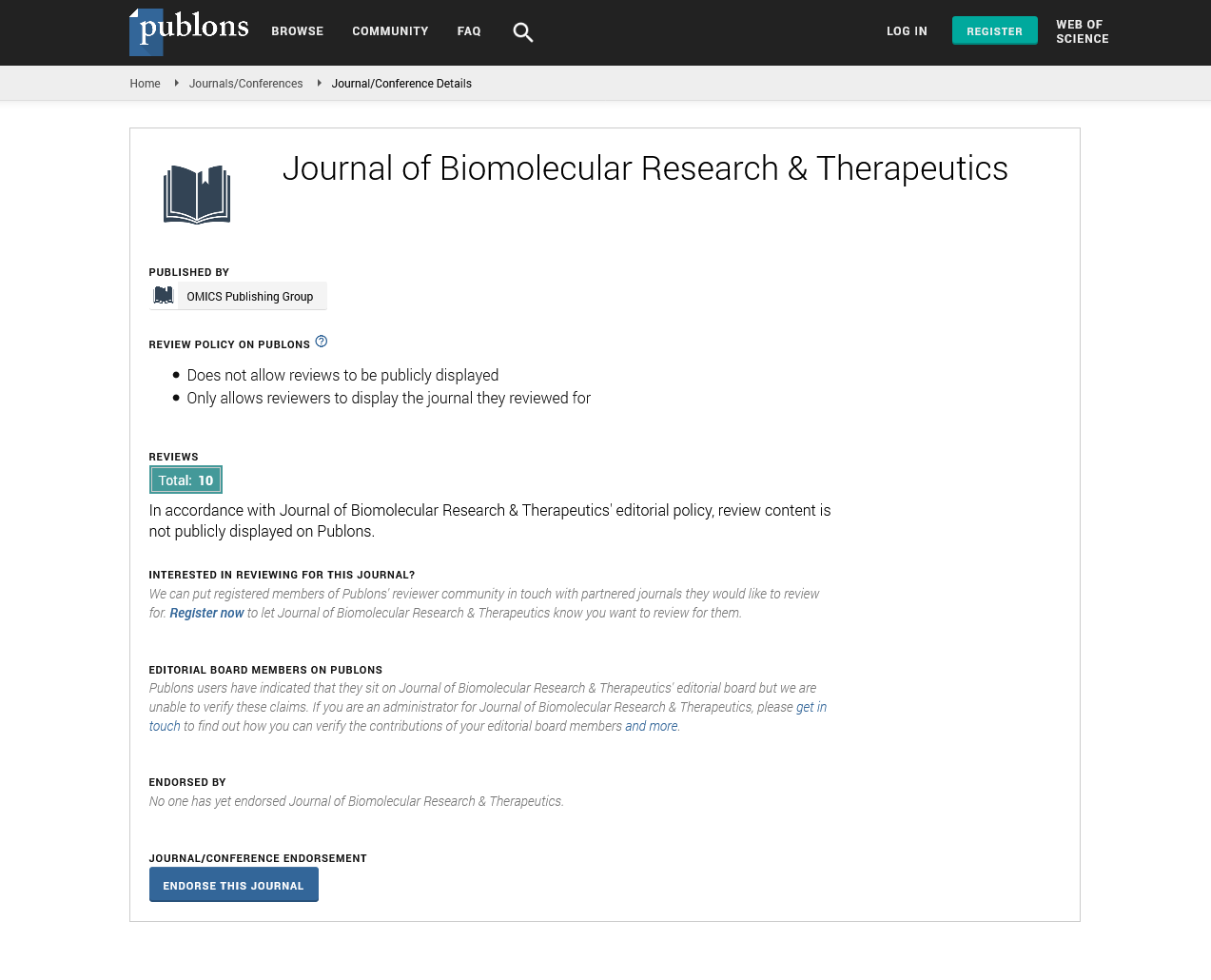Indexed In
- Open J Gate
- Genamics JournalSeek
- ResearchBible
- Electronic Journals Library
- RefSeek
- Hamdard University
- EBSCO A-Z
- OCLC- WorldCat
- SWB online catalog
- Virtual Library of Biology (vifabio)
- Publons
- Euro Pub
- Google Scholar
Useful Links
Share This Page
Journal Flyer

Open Access Journals
- Agri and Aquaculture
- Biochemistry
- Bioinformatics & Systems Biology
- Business & Management
- Chemistry
- Clinical Sciences
- Engineering
- Food & Nutrition
- General Science
- Genetics & Molecular Biology
- Immunology & Microbiology
- Medical Sciences
- Neuroscience & Psychology
- Nursing & Health Care
- Pharmaceutical Sciences
Opinion Article - (2024) Volume 13, Issue 5
Data Integration and Machine Learning in Cancer Biomarker Discovery and Targeted Therapies
Bernhard Hackl*Received: 30-Sep-2024, Manuscript No. BOM-24-27794; Editor assigned: 02-Oct-2024, Pre QC No. BOM-24-27794 (PQ); Reviewed: 16-Oct-2024, QC No. BOM-24-27794; Revised: 23-Oct-2024, Manuscript No. BOM-24-27794 (R); Published: 30-Oct-2024, DOI: 10.35248/2167-7956.24.13.411
Description
The identification of new cancer biomarkers and therapeutic targets is important for developing personalized cancer treatments. Advances in biomolecular technologies have generated large volumes of data related to genetic mutations, protein expressions and other molecular changes in cancer. Concurrently, clinical data, including patient responses to treatments and survival outcomes, is key to understanding how these molecular alterations manifest in patients. Integrating these diverse datasets is essential for uncovering new biomarkers and therapeutic targets. Information Technology (IT) solutions plays an important role in enabling the integration, analysis and interpretation of both biomolecular and clinical data, advancing personalized cancer therapies.
Bioinformatics, the application of computational tools to biological data, is central to this integration process. Biomolecular data, such as genomic, transcriptomic and proteomic data, is often vast and complex. Clinical data, comprising structured elements like patient demographics and unstructured information such as clinical notes, further adds to the challenge. IT solutions are indispensable in handling these large datasets, allowing researchers to combine them into a coherent framework that reveals insights into cancer's molecular mechanisms and identifies potential biomarkers or therapeutic targets.
A primary IT solution for data integration is the use of databases and data management systems. Large public databases, such as The Cancer Genome Atlas (TCGA) and the Genomic Data Commons (GDC), provide valuable resources for correlating genomic data with clinical outcomes across various cancer types. IT infrastructure allows researchers to query these databases efficiently and identify potential biomarkers by linking molecular changes to clinical outcomes, such as survival, treatment responses and disease progression. Moreover, proprietary databases developed by research institutions and pharmaceutical companies integrate internal biomolecular and clinical data, enabling the discovery of new cancer biomarkers and therapeutic targets.
Another important IT solution is advanced analytics and machine learning. Traditional statistical methods often struggle with high-dimensional biomolecular data and the complex relationships between genetic mutations, protein expressions and clinical outcomes. Machine learning, particularly deep learning algorithms, offers more effective analysis by identifying patterns and correlations within large datasets. These algorithms can reveal hidden relationships between molecular alterations and clinical outcomes, such as identifying gene mutations linked to poor treatment responses or resistance to certain therapies, thus suggesting potential therapeutic targets. By integrating clinical data, these models also help predict how individual patients will respond to specific therapies, leading to more personalized treatment plans.
Data mining techniques also play an essential role in extracting meaningful insights from large, integrated datasets. Using algorithms like clustering, researchers can identify subgroups of patients with similar molecular profiles and compare these profiles to clinical outcomes, identifying patterns associated with favorable or unfavorable prognoses. Additionally, data mining can uncover novel drug targets by identifying genes or proteins consistently altered in cancer cells and associated with key clinical features like metastasis or drug resistance. This systematic approach helps discover new cancer biomarkers and therapeutic targets that can guide drug development.
Cloud computing and big data platforms offer scalable storage and computational power to manage and analyze large datasets. These platforms allow researchers to process vast amounts of data more efficiently and facilitate collaboration across institutions. Cloud services like Amazon Web Services (AWS) and Google Cloud enable the integration of genomic data with clinical information, helping identify new cancer biomarkers and therapeutic targets. These platforms also allow for the integration of diverse data sources, such as Electronic Health Records (EHRs), medical imaging and clinical trial results, enhancing the ability to identify meaningful patterns in the data.
In conclusion, IT solutions play an important role in integrating biomolecular and clinical data, facilitating the identification of new cancer biomarkers and therapeutic targets. Through databases, machine learning algorithms, data mining, cloud computing and AI, IT solutions enable researchers to analyze large and complex datasets more efficiently. These tools are transforming cancer research, advancing personalized and targeted therapies and holding great promise for more effective cancer treatments. As these technologies continue to evolve, their impact on cancer research will only grow, offering new opportunities to improve patient outcomes and enhance our understanding of cancer biology.
Citation: Hackl B (2024). Data Integration and Machine Learning in Cancer Biomarker Discovery and Targeted Therapies. J Biomol Res Ther. 13:411.
Copyright: © 2024 Hackl B. This is an open-access article distributed under the terms of the Creative Commons Attribution License, which permits unrestricted use, distribution, and reproduction in any medium, provided the original author and source are credited.

